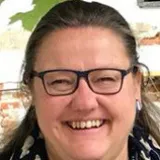Please note: this event has passed
Video recording of the Inaugural Lecture
If you missed the lecture, then don't worry! You can watch the full lecture below:
Register your place for this Inaugural Lecture on Microsoft Forms.
Join us to celebrate a special milestone for our new professors and hear about their inspiring career journeys. Doors for this event will open on 16.45 (BST), with the lectures to commence at 16.50. A drinks reception will be held at 18.00 immediately after the lecture.
Professor Elisabeth Ehler
Muscle & microscopy - my loves!
Abstract
Already in a conventional microscope, striated muscle cells are characterised by their regular stripes. These stripes are necessary for the muscle cells to contract and for example for the heart, this enables the supply of the body with oxygen and nutrients. Throughout my career I have been fascinated by muscle cells and also by different microscopy techniques that we can use to study them more closely. In particular I have been interested, how these regular arrangements are put together during development in the embryo and how they are changed in disease. Together with the help of my team and of collaborators, we have managed to find out more about key steps, which will be relevant in the future to develop better targeted screening and treatment strategies for e.g. cardiomyopathy.
Biography
Elisabeth Ehler was born in Steyr, Austria and did her Masters and PhD at the University of Salzburg, Austria. In 1994 she received an Erwin Schroedinger Fellowship from the Austrian Research Foundation to work at King’s College London for 2 years, after which she went to the Institute of Cell Biology of the ETH Zurich, Switzerland to join the laboratory of Prof Jean-Claude Perriard for 7 years. Since 2003 she has worked as a Principal Investigator at King’s College London, based at the Randall Centre for Cell and Molecular Biophysics. She was promoted to Reader in Cardiac Cell Biology in 2015 and to Professor of Cardiac Cell Biology in 2021.
Professor Claire Steves
Why we all age differently and what we can do about it: introducing ageing resilience
Abstract
The first rule about ageing is: there is no single definition of it. And that’s evident in studies of almost any trait over age. The reality is, that people age very differently to each other, and different aspects in a person age differently. Some people at very advanced ages are still hugely fit and able to do what they value in life. Others (sadly, the majority) are less fortunate, and find they are limited in what they can do, for significant spans of years at the end of life. What if we could harness understanding about these differences amongst us to level things up? This presentation focuses on research which explains some of this divergence in fortune between older adults, identifying key factors which could be modifiable, using the unique TwinsUK study of older adults. It takes a closer look at the COVID-19 pandemic which had a significant impact on older adults, and probes potential interventions to increase resilience of older adults to such stressors in the future.
Biography
Claire Steves entered medical school in Cambridge in 1994 being certain she would take a career in public health, but it wasn’t long before she was drawn into the personal and complex world of clinical medicine, and in particular to medicine for older people. It was nearly at completion of her registrar training as a geriatrician, that Claire decided to investigate how to put herself out of a job: to try to understand if we could reduce, or eliminate frailty in older age. She joined the Department of Twin Research at King’s in 2009 to do a Wellcome Clinical Research Fellowship in cognitive ageing, and has been leading ageing research at the department since then. In 2020 when the COVID pandemic came, Claire, together with the whole department, shifted her attention to shed insights on the COVID-19 pandemic, designing and leading work on the COVID Symptom Study and within TwinsUK which was then recognised as a vanguard cohort in the National Core Studies for Health and Wellbeing. Claire now leads a suite of grants from the Medical Research Council, Chronic Disease Research Foundation, and Wellcome Leap, using TwinsUK, aimed to improve resilience in older people.
Event details
Lecture Theatre 1, New Hunts HouseGuy’s Campus
Great Maze Pond, London SE1 1UL


